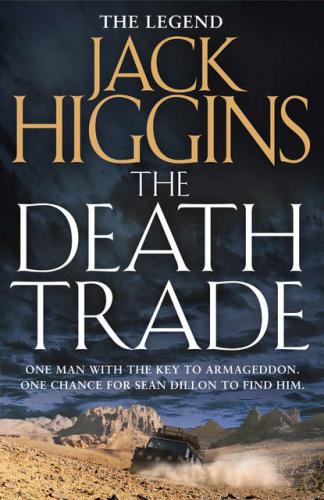JACK HIGGINS
THE DEATH TRADE
In Memory of My Dear Friend
David Coleman
Above all things, cherish life while you can, for death is serious business.
–SUFI SAYING
Table of Contents
Two Weeks Earlier: Nantucket London
St Anthony’s Hospice: Saudi Arabia
The man who called himself Ali LeBlanc surfaced from a deep sleep to cries of anguish, screams, gunfire, exploding grenades, and the roaring of many engines. It was the stuff of nightmare, but rising from the bed above the little café and moving to the window, he saw that this was no dream.
The previous evening he had left Tehran on the night plane to Iraq using his Iranian passport. His shabby canvas bag had a false bottom containing three passports, and he had chosen the French one for the flight from Baghdad to Aleppo. At an extortionate price, he had obtained a hire car to take him to Homs, and from there he intended to cross the border and proceed to Beirut. Its population of two million, its multiplicity of races and religions, would swallow him up. His Lebanese passport in the name of Ali LeBlanc indicated that he was of mixed French–Lebanese parentage, and a doctor, which was true enough, although he had not practised for some years.
He wore a dark suit showing signs of wear. He was sixty-four years old and seemed older, his eyes tired, his white hair uncut. Age had caught up with him, as well as the strain of travelling in the war-torn country, and he had stopped to rest at the café in the small town of Houla. As he stood by the window, the door opened and the café owner, Hassan, rushed in, beside himself with rage.
‘Stay back from sight. It’s a butcher’s shop out there.’
LeBlanc peered carefully from behind the curtain and was horrified by what he saw. Cars of every type, and light trucks with machine guns attached, crisscrossed each other, shooting at anyone who moved. Across the square, men and young boys were being lined up against any available wall and machine-gunned. Even the mosque was being used for that purpose. Women were being dragged inside by the hair, their assailants in semi-military uniforms, looking more like brigands than soldiers.
LeBlanc said, ‘Who are they?’
‘They belong to an organized gang culture a bit like the Mafia used to be in Sicily. Throat cutters to a man, they think nothing of killing children, the women after they’ve been raped. They’re supposed to be militia. The regular army tolerates them and lets them do the dirty work, which suits the government down to the ground.’ Hassan’s face was wild.
‘So what happens now?’ LeBlanc asked.
‘The doors are bolted, I’ve paid my protection. My wife and two daughters are locked in the cellar.’ He shrugged. ‘There’s not much more I can do. Come down to the kitchen. With what’s going on out there, you won’t have much of an appetite, but there’s coffee and several stronger things under the counter.’
LeBlanc glanced out of the window. The shooting had abated considerably. Most of the vehicles had roared away, the men in them laughing and shouting to each other, with only the odd shot in the distance. ‘No one moaning in pain, not a sound out there,’ LeBlanc said.
‘The bastards take pleasure in finishing everyone off,’ Hassan told him, leading the way downstairs and into the kitchen.
There was an eerie quiet, the aroma of good coffee from an electric percolator, an old AK-47 assault rifle lying on the table. Hassan went into the café and returned with a bottle of Courvoisier cognac, LeBlanc put his bag on the table and picked up the rifle as Hassan got the bottle open.
‘May Allah forgive me.’ He raised it to his mouth. At the same moment, the outside door was kicked aside and a brute of a man, bearded, long hair bound by a bandanna, slipped in. He was carrying a Mac 10 machine pistol.
‘Drop it or I’ll drop you,’ he told LeBlanc, who placed the AK-47 on
